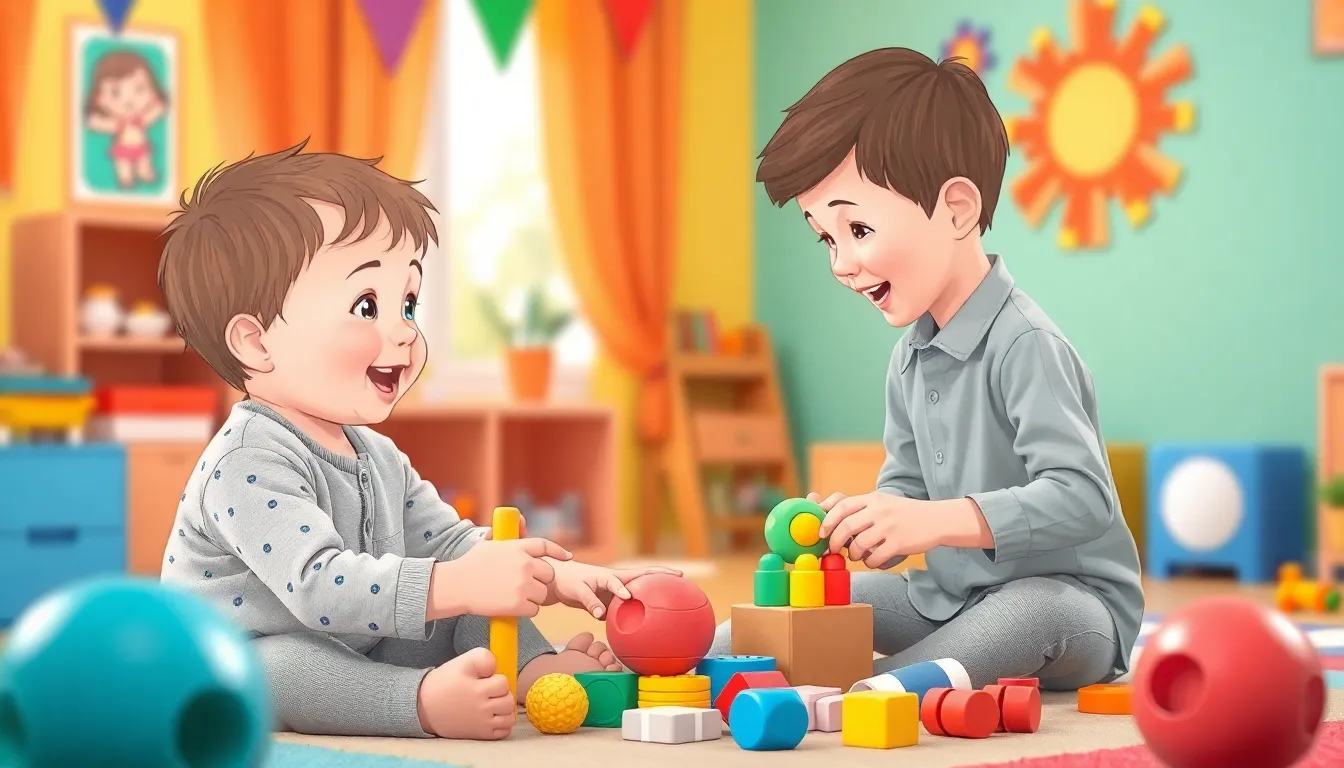Navigating the world of toddlers can feel like a wild rollercoaster ride. One minute they’re charming everyone with their adorable giggles, and the next, they’re staging a dramatic protest over a single pea. But what if there was a way to channel that boundless energy into something a bit more refined? Enter toddler etiquette—the secret sauce to transforming those pint-sized tornadoes into little ambassadors of good manners.
Teaching toddlers the basics of etiquette isn’t just about impressing Grandma at family dinners. It’s about equipping them with the social skills they’ll need to thrive in a world that often feels overwhelming. From sharing toys to saying “please” and “thank you,” these tiny lessons can lead to big changes. So buckle up as we explore the delightful journey of instilling etiquette in toddlers—where laughter meets learning and every misstep becomes a memorable moment.
Table of Contents
ToggleUnderstanding Toddler Etiquette
Teaching toddlers etiquette serves as a critical foundation for their social interactions. Manners such as sharing, saying “please,” and expressing gratitude contribute to their overall development. During early childhood, these skills promote positive relationships and emotional intelligence, setting the stage for future interactions.
Importance of Etiquette in Early Childhood
Etiquette shapes a toddler’s ability to navigate the social world. Understanding basic manners helps toddlers connect with peers and adults. Research shows that children exposed to etiquette lessons often develop better communication skills, increasing their ability to form friendships and resolve conflicts. Additionally, polite behavior fosters respect and kindness in social settings, making interactions smoother and more enjoyable. Parents and caregivers play a vital role in modeling etiquette, creating environments where positive behaviors can flourish.
How Toddlers Learn Social Skills
Toddlers acquire social skills through various engaging methods. Playtime acts as an essential opportunity for practicing sharing and cooperation. Observational learning proves significant; toddlers imitate the behavior of family members, peers, and caregivers. Reading books featuring polite characters introduces etiquette concepts in a fun way. Structured activities encourage social interaction, allowing toddlers to reinforce these skills through repetition in various contexts. Overall, this hands-on approach enhances their understanding of social norms and expectations.
Key Etiquette Lessons for Toddlers

Teaching toddlers key etiquette concepts fosters social growth and emotional intelligence. Engaging them in fun ways makes learning these lessons enjoyable and effective.
Basic Manners to Teach
Teaching toddlers basic manners sets a strong foundation for good behavior. Emphasizing “please” encourages polite requests. Reinforcing “thank you” helps toddlers express gratitude. Promoting “excuse me” facilitates respect in social interactions. Encouraging them to greet others cultivates friendly communication. Providing positive reinforcement for using these phrases ensures consistent practice.
Sharing and Taking Turns
Sharing and taking turns are essential skills for toddlers. Modeling sharing during playtime illustrates its importance. Encouraging children to share toys or resources promotes cooperation. Implementing turn-taking games creates opportunities for practice. Explaining how taking turns benefits everyone fosters patience. Praising toddlers when they share or wait reinforces these behaviors, leading to smoother social interactions.
Practical Tips for Parents
Parents play a vital role in teaching etiquette to toddlers. They can create an environment that reinforces positive behaviors.
Modeling Behavior
Children learn by watching adults. Parents who consistently use polite language demonstrate manners in everyday conversations. Saying “please” and “thank you” regularly shows toddlers how to interact respectfully. Engaging in courteous behavior during family meals sets an example of good etiquette. Parents should express gratitude when receiving help, teaching even the smallest ones the power of appreciation. By using polite gestures, parents illustrate kindness and respect, prompting toddlers to mimic these actions.
Using Role Play and Games
Role play makes learning fun and interactive. Parents can set up scenarios that involve greeting a friend or sharing toys. Using dolls or stuffed animals to act out different social situations allows toddlers to practice skills in a safe environment. Games like “Simon Says” or “Charades” can incorporate polite phrases, reinforcing positive interactions. Encouraging treat exchanges during playtime builds sharing skills naturally. These playful activities not only spark joy but also solidify understanding of etiquette in a memorable way.
Encouraging Positive Behavior
Fostering positive behavior in toddlers lays the foundation for their social skills. Parents can do this through various strategies designed to nurture manners and etiquette.
Praise and Reinforcement
Recognizing good behavior encourages toddlers to repeat it. Simple phrases like “Great job sharing!” reinforce positive actions. Parents notice when toddlers use polite language, celebrating these moments to build confidence. Regular praise boosts self-esteem, making toddlers more likely to continue displaying good manners. Engaging in specific compliments about their actions, such as “You said thank you without being prompted,” fosters a deeper understanding of etiquette. Encouraging repetition of these behaviors through enthusiastic responses creates an environment where kindness thrives.
Setting Expectations
Clear expectations guide toddlers in understanding acceptable behavior. Parents define what manners look like, using simple, age-appropriate language. Consistency helps reinforce these standards during various situations, such as playdates and family gatherings. Establishing rules like “We say please before asking” provides toddlers with a framework to operate within social contexts. Reminding them of these expectations before potentially challenging scenarios, such as sharing toys or meeting new friends, encourages adherence. Gentle reminders, along with patience, give toddlers the tools they need to succeed in demonstrating positive behavior.
Teaching toddlers etiquette is a rewarding journey that lays the groundwork for their social interactions. By instilling basic manners like saying “please” and “thank you,” parents and caregivers help shape their emotional intelligence and communication skills.
Creating engaging learning experiences through play and daily routines makes this process enjoyable for both toddlers and adults. With consistent modeling and positive reinforcement, children can develop essential social skills that will benefit them throughout their lives.
Ultimately, fostering good manners in toddlers not only enhances their relationships with peers and adults but also nurtures a sense of confidence and self-esteem.



